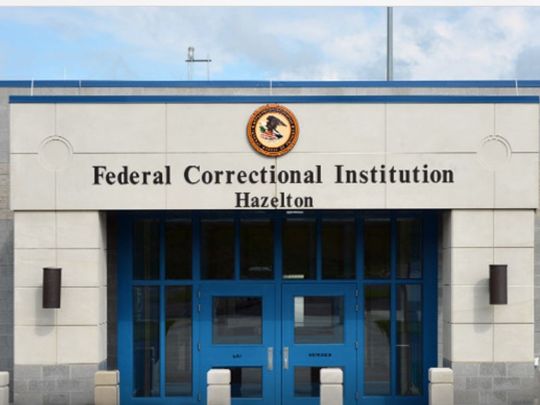As the pandemic continues to affect inmates and workers at U.S. Bureau of Prisons facilities in Preston and Monongalia counties, staff at both are coping without additional manpower or compensation.
By the numbers
According to the U.S. Bureau of Prisons website, as of Thursday, USP Hazelton had 1,401 inmates; FCI Hazelton (men), 1,261 inmates, FCI Hazelton (women), 382; and the low-security Hazelton camp, 56 inmates.
FCI Morgantown had a total of 443 inmates as of Thursday.
Also as of Thursday, the website showed 17 inmates and 51 staff members COVID-positive at USP Hazelton, and 24 inmates and 43 staff members at the penitentiary recovered.
The bureau reported 64 inmates and 22 staff at FCI Hazelton testing positive, with 80 inmates and 22 staff there recovered. There was no breakdown between the male and female sections in those numbers.
At FCI Morgantown, the website shows five inmates and seven staff members were positive, while 116 inmates and 14 staff members have recovered from coronavirus.
The bureau report shows no inmate or staff deaths attributed to COVID.
Protocols
Earlier in the pandemic, there was a lot of discussion about whether the U.S. Marshals Service was following Bureau of Prisons protocols for bringing inmates to prisons. There was particular concern in West Virginia, which at the time had a very low COVID infection rate.
Rick Heldreth, president of Local 420 of the American Federation of Government Employees, which represents workers at Hazelton, said agency protocols on testing and isolating incoming inmates are going well now.
“We have still had some incoming transfers test positive after arriving (three last week). The U.S. Marshals have done a better job of this lately than earlier in the pandemic, but some still manage to slip through. Once we identify those inmates, we apply our protocols and isolate them,” Heldreth said.
If the protocols weren’t being followed, outbreaks would be worse, he said. “We have seen this happen at other institutions throughout the last year.”
Greg Livengood, president of AFGE Local 2441 at FCI Morgantown, said the locally established protocols for testing and isolation are being followed and seem to work.
Looking at the numbers, it seems there are more COVID cases at FCIs (federal correctional institutions, which are low- and medium-security) like FCI Hazelton and FCI Morgantown than at the high-security penitentiary at Hazelton.
Livengood attributed that to the way inmates are housed.
“As noted in several Congressional inquiries, many lower security facilities, which includes some FCIs, employ ‘open bay housing,’ which makes it difficult to socially distance inmates, whereas higher security institutions are better equipped/designed to secure and separate inmates,” Livengood said.
“There were some differences in procedures before that I don’t feel were consistent,” Heldreth said. “We seem to have those under better control now.”
Impact on workers
There’s no “hero pay,” additional staffing or other perks, though the union as a whole is seeking the application of hazard pay.
Staffing has been an ongoing struggle at Hazelton. In the year leading up to the pandemic, great strides were made toward bringing staff levels up to where they need to be, Heldreth said.
“But once [the pandemic] started, our hiring slowed dramatically. Since that time, mandatory overtime for officers and augmentation reassignment of non-officer staff has went through the roof,” he said.
Augmentation is when prison employees who are not correctional officers are called in to fulfill an officer’s duties. Though they receive the same basic training, full-time officers say it’s dangerous for the workers and inmates, because the augmented staff isn’t familiar with the inmates, the areas and the equipment.
“Especially in the past few months, it has reached the point where officers are working forced overtime two to three times a week,” Heldreth said.
During the same time period, 15-25 augmented personnel are called on to cover officer posts each day.
“This keeps those staff from performing the regular, important work that they were hired to do. COVID has definitely made it more difficult to hire staff,” Heldreth said.
Livengood said FCI Morgantown is not short-staffed.
“We’ve been fortunate to not have any large staff outbreaks. Likewise, the staff our local represents have really stepped up during this pandemic, and any outbreaks we have had have been handled appropriately and without complaint,” Livengood said.
But that only makes the lack of extra pay or staffing harder to swallow, he said.
“We feel abandoned,” Livengood said.
Changes in routine
The FCI has had to make adjustments in day-to-day operations because of the staff. The biggest, Livengood said, is elimination of inmate work details.
“Consequently, staff are taking on a lot more work in certain areas, i.e. meal preparation and service, to keep the institution up and running. Again, staff have really stepped up during this time,” he said.
Inmate access to outdoor recreation areas has been limited and, in some cases, suspended at FCI Morgantown.
And, “with the suspension and limitations of outside recreation, the housing unit officers are supervising larger groups of inmates for longer periods of time, as the inmates are confined to the housing unit more,” Livengood said.
TWEET @DominionPostWV




